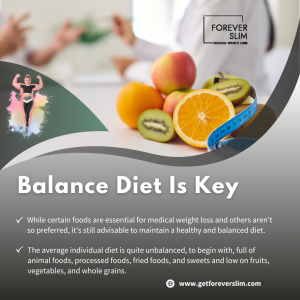
Medical Weight Loss in Little Elm, TX
There are certain medical weight loss principles that most professionals recommend for those looking to achieve excellent weight loss results. If you want to achieve excellent weight loss results, you should follow these principles.
Eat Regular Meals

Eating regular meals is one of the recommended principles of weight loss. Avoid skipping meals. Regular meals give you the energy to get through the working day.
Skipping your meals or having irregular meals may lead to unnecessary snacking and make you lose track of portion sizes and calorie counts.
Eat thrice daily and monitor your total calories (generally 1000 – 1200 for women; 1500 – 1600 for men).
Eating regularly sends your brain signals that you’re not starving, so it can start burning excess fat even during your normal daily activities.
Increase Your Fruit and Vegetable To Fill Up on Fiber
Fiber absorbs water and swells in the stomach, increasing fullness and satiety in the long term.
So raise your intake to provide bulk to fight the hunger pangs. Ensure to prepare your vegetables using healthier cooking methods such as blenching, steaming, or stir-frying with less oil to make them even more beneficial.
In addition to fruits and vegetables, fill up on a variety of minimally-processed plant-based foods such as whole grains, beans, and lentils to add even more fiber to your diet and encourage weight loss.
Opt for Food and Beverages with Less Sugar
Sugar only supplies the body with calories and no additional nutritional value. The calories from sugar can spoil your appetite and increase calorie intake, which also increases body stores of fats. Choose pure water instead of sweetened drinks to quench your thirst and stay hydrated.
Avoid adding too much sugar to tea or coffee, request less sugar or syrup in your desserts, and go for food products labeled with unsweetened, less sugar, reduced sugar, or lower sugar.
Protein is the Most critical Nutrient for Weight Loss.
Another principles of medical weight loss is that protein is essential in weight loss. Increasing the amount of protein you consume can help support weight loss by regulating certain hormones and helping you feel fuller and longer achieve a better-looking body.
Proteins offer the body the building blocks it needs to meet daily metabolic needs, as well as energy for survival. Make sure to consume at least four palm-sized servings of protein daily, and start your day with a serving of protein.
Limit Unhealthy Cravings
Strict diet restriction is one of the primary reasons for unhealthy cravings. Due to this, professionals mostly recommend exercise along with an appropriate calorie diet to avoid starvation, which can cause you to crave unnecessary snacks that cause you to gain weight.
Limit snacking on oily, fried, or sweet foods such as cakes and pastries that add extra calories to your diet. Identify the things that trigger your unhealthy cravings; it could be mood or stress.
And if you experience hunger pangs, choose lower-calorie options like fresh fruit, low-fat yogurt, and tuna or low-fat cheese sandwiches made from whole-meal bread. You can also add (vegetables like cucumber and tomato slices to your sandwiches for a nutritious, packed, filling snack.
Water Is Essential For Medical Weight Loss
Drinking water is essential for many factors involved in weight loss, such as ingestion and muscle function, such that a minimal amount of dehydration can hurt your metabolism and affect weight loss.
Staying hydrated is one of the principles taught in medical weight loss for many reasons. One of the reasons is that water is a natural appetite suppressant.
When you drink a sufficient amount of water, it takes up space in the stomach, and when the stomach receptors sense that it is complete, signals are sent to the brain, leading to a feeling of fullness and reducing hunger. Also, water temporarily increases the number of calories burned while the body is at rest.
Drinking enough water is essential for burning off fat from food consumed and stored fat. Without enough water, the body won’t be able to metabolize fats.
Balance Diet Is Key

While certain foods are essential for medical weight loss and others aren’t so preferred, it’s still advisable to maintain a healthy and balanced diet. The average individual diet is quite unbalanced, to begin with, full of animal foods, processed foods, fried foods, and sweets and low on fruits, vegetables, and whole grains.
Finding a popular diet that doesn’t encourage dieters to consume various fresh, natural plant foods isn’t straightforward. Having a perfectly balanced diet may seem unachieved, but one can at least curate a more balanced diet rather than the average diet to maintain a healthy weight.
Consistency
Weight loss routine is not like a one-shot vaccine: one shot, there’s a need for consistency to achieve and maintain results. It requires a long commitment. According to many reviews, the more you’re consistent with your medical weight loss treatment routine, the greater your chances of maintaining a healthy body weight.
A common misconception of weight loss is that those who achieve long-term success start with a more moderate, slow-and-steady approach than the crash dieters who adopt severe restrictions only to give up halfway after a few weeks or months and regain their weight.
There is no evidence that long-term successes start differently. The significant difference is that they simply keep doing what they started doing.
Plan and Monitor Your Weight Loss Progress
Weight loss should be handled like any significant project in your life; the success of your weight management program depends on careful planning and monitoring of programs.
Plan your meals and exercise routine to know what food to eat and what activity to do at each time of the day. You can use a journal or an app to track what you eat, when you eat it, and how much, as well as your exercise routines and daily physical activities. Check your progress to know if your weight loss plan is effective.
Don’t Compare Your Weight Loss Journey To Others
Each individual is unique and has their metabolic rates. People also vary in how many calories they burn daily or how much exercise they do.
Aim for a healthy rate of weight loss, and plan to achieve successful results that will last long term.
Avoid measuring yourself by what others are doing or the weight loss results they’re performing. Your medical weight loss journey is unique; don’t compare it to others.
Changing Your Diet Isn’t The Only Change You Need For Medical Weight Loss
Another medical weight loss principle you need to know is that your food isn’t the only thing you need to change to achieve your ideal weight. You need to change your sleep habits and ensure you’re getting enough night sleep. Stress could also influence weight.
Identify your source of stress and find a way to remove or minimize the stress. You need to have a good exercise routine for weight loss and make some changes in your daily routine to ensure you get enough time for these exercises.
You can also start journaling your food consumption and weight loss and maintenance, in general, to keep you in check and on the path.
Building Strength
Building strength is one of the principles of medical weight loss. One may be wondering why this is so; it’s because strength-building has a lot of health benefits. It not only helps improve bone and muscle strength but also contributes to increasing muscle mass, and more muscle mass increases resting metabolic rate, helping the body burn more calories.
To maintain your weight loss results, it’s recommended to do muscle-strengthening activities at least twice a week, which involve all major muscle groups in the body ranging from the upper to lower body. Build strengthening requires repetitive movements, like an arm curl or sit-up.
The best activities for muscle and bone-strengthening include hand-held weights, resistance bands, calisthenics, strength training equipment, and rock climbing.
Stay Motivated

Motivation will help you stay consistent and achieve long-term success. Once you’ve your weight loss plan, be consistent with it and motivate yourself by focusing on gains to keep you on track. Become confident in your daily activity, knowing you will soon achieve your goals.
Notice how different your clothes fit – maybe they feel loose, or you now fit into something that didn’t used to be your size, or perhaps you have more energy, and things take less effort.
Stay motivated through the journey; don’t only focus on the end goal without celebrating your small wins.
Make Certain Behavioral Changes
The most effective behavioral changes you can teach to promote medical weight loss include sleeping well and waking up early.
The body’s metabolism speeds up between 4 and 5 a.m. and stops between 8 and 9 p.m. The body gets enough rest and heals itself better when it is asleep.
Stress less, minimize the effect of stress on your body by picking fun activities to relax and de-stress. Avoid spending so much time on the screen or your smartphone or laptop.
Keep Your Weight Loss Goals Realistic
Losing and maintaining your new weight forever while enjoying a tasty, nutritious diet is possible. However, there’s no quick fix; medical weight loss is not a surgical procedure.
It would help if you were realistic about your short and long-term weight loss goals and understood that healthy weight takes time and that maintenance involves permanently altering certain habits for good.
Make things easier for yourself by starting with minimal, realistic, achievable goals to achieve long-term success.




